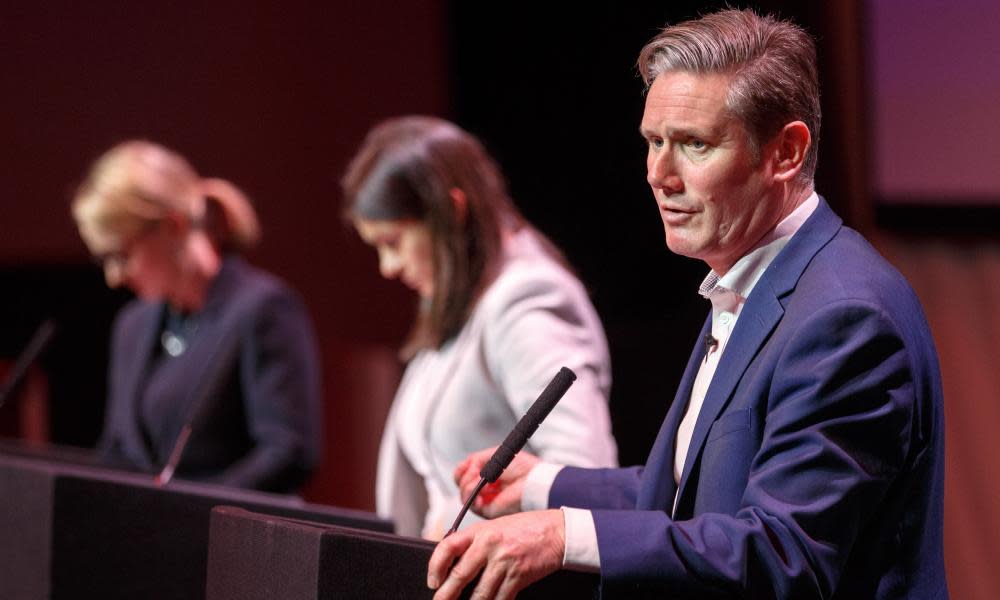Labour leadership poll opens as Keir Starmer promises jobs to rivals

Keir Starmer has pledged to give “top” shadow cabinet roles to his two rivals for the Labour leadership, as voting opened for party members to pick who should succeed Jeremy Corbyn.
Starmer, seen as the frontrunner in the race, which will result in a new leader being announced on 4 April, said he was pleased that he, Rebecca Long-Bailey and Lisa Nandy had not been “taking lumps out of each other”, which he said “bodes well for the Labour party”.
Asked on Sky News who he would appoint to his shadow cabinet if he won, Starmer said he had not been talking to anyone and that any rumours of jobs being offered was “just wrong”.
However, he did confirm comments from a hustings event on Sunday that he would hope to offer roles to his rivals: “I made it very clear that I thought Rebecca Long-Bailey and Lisa Nandy were putting through very powerful cases, and that together, the three of us will be the leadership of the Labour party.”
Both, he said, should be “in the top team of any shadow cabinet”. But he refused to say what jobs they could take, saying: “I’m not going to play this game.” Both have said they would serve in the shadow cabinet if either of their rivals wins, and have pledged to find roles for the others if they win.
The first stage of the contest was for potential contenders to get the backing of 22 fellow MPs by 13 January. Five MPs passed this threshold: Keir Starmer (88 nominations), Rebecca Long-Bailey (33), Lisa Nandy (31), Jess Phillips (23) and Emily Thornberry (23).
The second stage required each contender to win the support either of 33 constituency Labour parties (CLPs); or of three affiliates, two of which had to be unions, and which between them accounted for at least 5% of the affiliated membership. This had to be achieved before 14 February. Jess Phillips withdrew from the contest on 21 January. Emily Thornberry failed to attract the required number of members.
The ballot of members and registered supporters was due to open on 21 February, and closes at noon on 2 April. To be eligible to vote you must have been a Labour member on 20 January, or have applied to have become a £25 registered supporter by 16 January.
Corbyn’s successor - Starmer, Long-Bailey or Nandy - will be announced at a special conference in London on 4 April.
Starmer also vowed to scrap salary thresholds for migrants coming to Britain if he becomes Labour leader.
Last week, the Home Office announced it would introduce a points-based immigration system – with points awarded for key requirements such as being able to speak English to a certain level, having a job offer from an approved employer, and meeting a minimum salary threshold.
The salary threshold for skilled migrants will be lowered to £25,600 for those coming to the UK with a job offer and there may be concessions for those earning no less than £20,480 as long as they still meet certain requirements or their occupation is short of staff.
Starmer said: “The position the government has just taken is completely wrong – where they are equating the worth of an individual coming to this country by how much money they earn. I think that’s profoundly the wrong approach.
“I think the idea that if you don’t earn a certain salary you’re not bringing anything of any worth to this country is offensive.”
Asked if he would do away with salary thresholds, he replied: “I would – I do not think they are the right measure for the worth of an individual coming to this country.”
Quizzed on where he stood, ideologically, between Corbyn and Tony Blair, Starmer refused to say, but agreed that Blair’s governments “did amazing things and made real change”, citing areas such as Sure Start and the Northern Ireland peace process.
But, he said, given that the next election was not likely to be until 2024, a new Labour government would be making plans for the late 2020s.
He said: “I personally think it’s a mistake to look backwards and try to find a model somewhere else. All Labour governments, whenever they’ve won power, have done it by focusing on the future.”
Starmer also repeated his call for unity: “What I’ve been saying to our members is every Labour government only happens because our party and our movement came together and said: ‘We’re going to be united. We’re going to do something that gets us into power.’
“And, I feel very strongly, the next stage of the journey is for the leader and our members over the next four years to say: ‘We will write the next chapter of our history.’”
Members will also vote for a new deputy leader: Angela Rayner, seen as the frontrunner, Dawn Butler, Ian Murray, Rosena Allin-Khan or Richard Burgon.
Speaking on Sunday, Long-Bailey said she would accept a job in either of her rivals’ shadow cabinets and would offer them both roles.
“I would. I think they’re both brilliant,” the shadow business secretary said. “And I would do whatever I was asked and whatever it takes to make sure, if I didn’t become leader, we were elected as the next Labour government.”
Nandy also praised her opponents: “I like both of these people. I respect them. I would want them in my shadow cabinet doing big jobs,” she said. “But I would equally be happy to serve alongside them in whatever role they chose to give me.”


